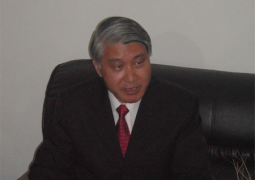The report entitled, ‘the International Disaster Response Law (IDRL)’, was commissioned by the Gambia Red Cross Society (GRCS) in collaboration with the International Federation of Red Cross and Red Crescent Societies (IFRC).
It was based on a review of The Gambia’s legislation applicable to international disaster response in light of the guidelines for the domestic facilitation and regulation of international disaster relief and initial recovery assistance.
The GRCS initiated the process of the research in response to the call by states made at the 31st International Conference of the Red Cross and Red Crescent.The call was for national legal frameworks for the facilitation and regulation of international disaster response to be examined and strengthened.
It was based on this that in June 2014, the GRCS and the IFRC, in collaboration with the National Disaster Management Agency (NDMA) of The Gambia, began a process to sensitise relevant government partner agencies and lawmakers on the relevance of integrating facilitative domestic regulations for international disaster response in the national response system.
The project came at a time that the National Disaster Management (NDM) Act, 2008 is being reviewed.
Though it was established that the existing Act has many solid aspects, there is a need for improvement in order to make it more comprehensive, coherent and adaptable to new problematic areas of disasters that have diversified and increased in recent years.
In the research process, consultations were done with representatives from the Office of the President, NDMA, National Assembly, GRCS and key government agencies and other humanitarian partners.
The objective was to support government-initiated effort to strengthen the country’s legal preparedness for disaster, improve awareness on disaster law and knowledge, strengthen laws and procedures for disaster response, and promote effective international disaster response laws among legislators and stakeholders involved in disaster management and response.
In reviewing the relevant legal and institutional framework, the report has identified a number of strengths.For example, The Gambia has developed a National Policy on Disaster Management, a Strategic Framework, a National Disaster Risk Management Plan, and a Multi-Hazard Contingency Plan.
Moreover, a number of national and institutional structures and coordinating mechanisms including a focal point for Disaster Risk Management (DRM) have been established namely the NDMA which is directly under the Office of the President and the National Platform for Disaster Risk Reduction (DRR) and Climate Change Adaptation (CCA).
There are also many sectoral laws with provisions directly or indirectly dealing with DRM in general.
However, by and large, these laws are fragmentary and difficult to apply in order to adequately coordinate and facilitate speedy and timely provision of international relief assistance.
There was no comprehensive legislation governing the facilitation and regulation of international disaster assistance, as the IDRL report has noted.
In light of these findings, the report put forth a number of recommendations, with the main focus being on the following: revising the existing NDM Act 2008 in order to capture the findings and recommendations in the report as they relate to international disaster relief and recovery assistance; and clearing the procedures for receiving international disaster assistance and coordinating national disaster relief efforts to be included in the National Disaster Risk Management Plan.
By adopting and implementing the recommendations set out in the IDRL report, The Gambia is set to improve its capacity to manage disasters nationally and properly regulate incoming international disaster assistance.
A comprehensively revised national legal framework, including provisions catering for international disaster response, will ensure a well-coordinated assistance in the event of a major disaster, and will encourage prompt assistance for affected persons and assisting international bodies.
The research exercise was conducted by Bandirabeh Consultancy Firm within a space of two years. Source: Bandirabeh Consultancy Firm in The Gambia.



